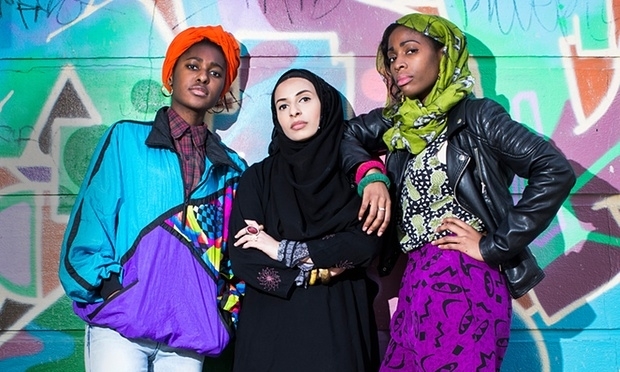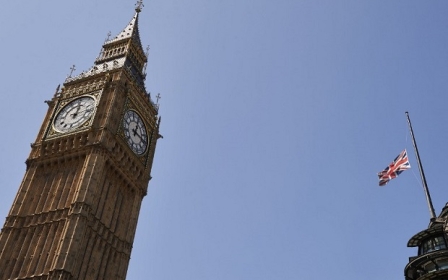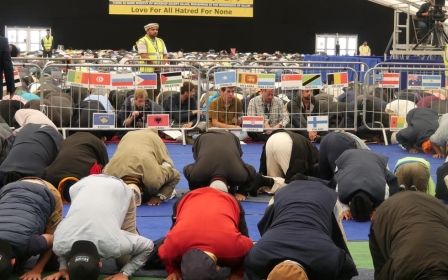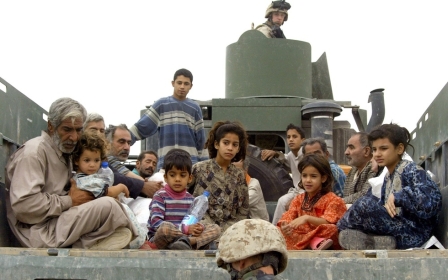UK arts officials raise censorship concerns over cancelled 'jihadi play'

Senior figures at Arts Council England, the UK's main arts funding body, raised concerns that the controversial cancellation of a play about radicalisation amounted to censorship and discussed whether they should step in to “help find a way to get this play shown,” newly released emails have revealed.
The emails, obtained by Middle East Eye via a Freedom of Information request, also reveal criticism of the National Youth Theatre (NYT) over its handling of Homegrown, a production set and staged in a London school which had been promoted as a highlight of the company's summer season until its abrupt cancellation just days before its opening night.
“NYT seem to be handling their comms very badly on this jihadi play. Are we happy that they are solid on the substance of their decision?” Mags Patten, the Arts Council's National Director for Communications, wrote in an email to a colleague on 5 August.
“We need to be careful that if we are asked about it that we are being supportive ... but always mindful of the vital importance of freedom of expression. Helping them to find a way to get this play shown?”
Omar el-Khairy and Nadia Latif, who wrote and directed Homegrown, have complained of censorship and believe it may have been cancelled because of heightened political sensitivity surrounding the issues it explores. The NYT has also faced criticism from anti-censorship campaigners and leading figures in the arts world.
The play, which was partially inspired by the case of three schoolgirls who absconded from East London to Islamic State-controlled Syria earlier this year, includes references to the government's Prevent counter-terrorism strategy and Channel deradicalisation programme, which many British Muslims consider to be discriminatory and alienating.
“We are making art in a particular climate: the climate of Prevent and Channel – programmes which are creating an environment in which certain forms of questioning, let alone subversion, of the given narrative pertaining to radicalisation or extremism can be closed down,” the play's creative team said in a statement following its cancellation.
The NYT initially said it had dropped the production because of quality concerns, but an email from Paul Roseby, the company's artistic director, appears to confirm that its content was also under scrutiny, with Roseby telling colleagues that the creators had failed to justify “their extremist agenda” and that the production “lacked in-depth analysis, balance or debate”.
“From a creative point of view ... the show is clearly very one-dimensional in tone and opinion without, as of yet, any intelligent character arcs justifying the content,” he wrote on 30 July, one day before the cast was informed that the play had been dropped.
“The creatives have failed to meet repeated requests for a complete chronological script to justify their extremist agenda and so it doesn't look good for the future of Homegrown on National Youth Theatre turf.”
The emails further confirm that the production company met with police officers to discuss the play, and that their concerns influenced Roseby's decision.
El-Khairy and Latif say they were told a week before rehearsals were shut down that the police wanted to see the script and planned to place plainclothes officers in the audience.
“Whilst the police felt it was a valuable and important subject and supported the initiative, they rightly raised some concerns over the content with particular reference to any hate crimes and the ability for the National Youth Theatre to control all social media responses,” Roseby wrote.
Responding to Roseby's email in a message to colleagues, Eleanor Hutchins, Arts Council England's head of media, expressed concern that the NYT would face complaints of censorship.
“That they pulled the show because of its extremist content is clear but could they be accused of censorship?” she wrote.
Arts Council England is a publicly funded organisation promoting arts and culture and a principal funder of the NYT, although the emails suggest it did not fund Homegrown directly.
Jo Glanville, director for the anti-censorship campaign group English PEN, told MEE it was “fantastic” that Arts Council England had raised concerns about protecting freedom of expression in relation to the play's cancellation.
“The arts should be an arena for exploring anything and everything, and nothing should be off limits,” Glanville said.
“Government rhetoric around extremism and the laws they have passed have created a climate of fear, anxiety and censorship, and what has taken place is the direct result of an arts organisation thinking, 'This subject is so taboo that we could run foul of the law.'”
Roseby's email reveals details of other factors which also appear to have influenced his decision, including the withdrawal of a number of cast members, parental complaints, and the use of “insensitive," "inappropriate and disrespectful" language by the creators in their dealings with the NYT.
The play featured a cast of more than 100 young actors, and Roseby said the rate of attrition had been “unusually high,” with five performers quitting during the first week of rehearsals. Two parents had expressed “grave concern over the direction of the piece," while another had been “more favourable”.
El-Khairy and Latif say they were given no warning that the NYT was considering cancelling the production and said that concerns about the quality of the piece had not been raised with them.
El-Khairy told MEE he had originally been approached by the company at the end of last year to write a script about the "Trojan Horse" affair, the alleged infiltration of schools in Birmingham by conservative Islamic groups.
“They had a very specific play in mind. They were looking for two writers, in their words 'One British and one Arab,' to collaborate on a piece set in a school,” he said. “I met them and they clearly decided I was 'both British and Muslim enough'.
“I then set about responding to the brief because it was slightly crude in terms of some of the intellectual ideas they were presenting, in terms of good Muslims and bad Muslims and who is radicalising whom. In all creative dynamics there are tensions and pressures but that conversation was fine and it was going back and forth.”
In a statement to MEE, NYT said its decision to cancel Homegrown had been prompted by the failure of its creators to assure them that its subject matter would be “handled sensitively and with editorial balance and justification,” and said it was releasing rights to the play to El-Khairy.
“We do not regret commissioning Homegrown and wholeheartedly agree with those that have stated that the issues raised by the creeping radicalisation of the young should be addressed by the arts. We set out to do so but on this occasion were not successful,” the statement said.
A spokesperson for Arts Council England said: “The Arts Council believes that freedom of expression is vitally important; we are fully supportive of arts organisations pushing boundaries and presenting challenging work. It is not our role to censor the artists' message.”
El-Khairy said he and Latif were now in discussions with other organisations and hoped that the play could be staged elsewhere.
New MEE newsletter: Jerusalem Dispatch
Sign up to get the latest insights and analysis on Israel-Palestine, alongside Turkey Unpacked and other MEE newsletters
Middle East Eye delivers independent and unrivalled coverage and analysis of the Middle East, North Africa and beyond. To learn more about republishing this content and the associated fees, please fill out this form. More about MEE can be found here.




